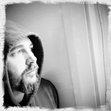William Cook's Blog, page 8
July 2, 2014
Book Review Shout-out
Recently I've had a few books of mine that I've given away for free. If you happened to download a free copy and can be bothered dropping a short review I'd really appreciate it. As someone who has been self publishing for nearly two years now (alongside traditional methods) I have yet to receive my first royalty check from Amazon! Shocking I know, but a true story nonetheless - so, any little review or feedback I receive is cherished and much appreciated as it helps make this whole lark worthwhile. Thanks to those of you who already have left reviews for myself and other authors.
If there are any of you out there who would like a free e-version (Kindle,Nook, PDF) for review purposes of any of my titles, please comment in the section below or contact me via williamcookauthor (at) gmail (dot) com- visit my Amazon page here for details about my various titles.
Enjoy the rest of your week.
William
#books #reviews #indie
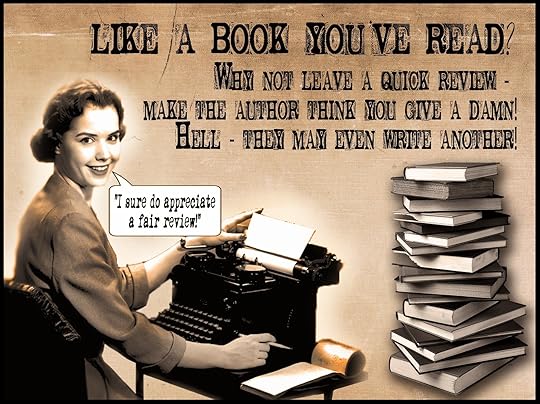
If there are any of you out there who would like a free e-version (Kindle,Nook, PDF) for review purposes of any of my titles, please comment in the section below or contact me via williamcookauthor (at) gmail (dot) com- visit my Amazon page here for details about my various titles.
Enjoy the rest of your week.
William
#books #reviews #indie

Published on July 02, 2014 15:24
June 29, 2014
New Horror Anthology Release – Terror Train
Proud to say I have a story in this anthology (‘One Way Ticket’) – in fact, one of the more complex stories I’ve written and one that I hope operates on a few different levels. The Terror Train Anthology, published by the good folk at James Ward Kirk Fiction, includes both stories and poetry about murder, madness, mayhem, monsters, and the macabre on the rails! The stories take us on a train ride that begins in New York and ends in California, with a little time in Europe, and includes over forty stops in between. Included in this magnificent collection is one by the legendary William F. Nolan titled “Lonely Train A Comin’.” The old west, a character that travels back in time, a tale from the future – they are all there. We have stories full of evil, revenge, love, lust, and mystery. We even have a little noir and, of course, a whole lot of Horror! Trust me, it’s a ride you won’t soon forget. The anthology has been getting lots of positive reviews, so be sure to check it out via the links at the end of this article.
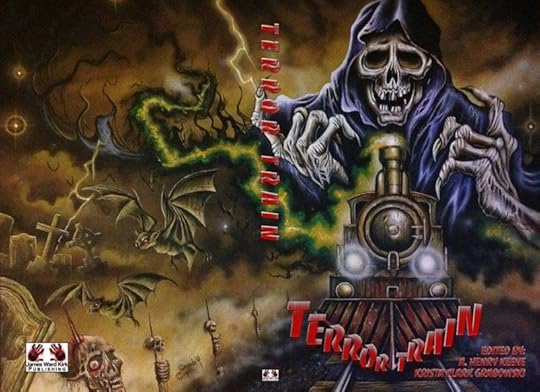
TERROR TRAIN ANTHOLOGYEDITED BY A. HENRY KEENE & KRISTA CLARK GRABOWSKI
All aboard theTerror Train
From NYC to New Orleans, through winding paths and cityscapes, it grinds the rails and shatters the dead of night. It comes, stopping at stations along the way, to steal the screaming souls of the living and the dead and transport them to hell… The Terror Train rides, from city to city, from village to village, through states, across rivers and mountains. If only it could tell its tales of grisly murder, of demonic pacts, black holes into different dimensions and portals to other realms where the ghosts of train robbers hunt in perpetuity for that elusive bullion filled carriage that cost them their immortal souls. Behold the terrors the train has witnessed, see firsthand the horrors it has lived through and when you get on board, pray, pray you’ve entered the right one, on the right track, the one that does not lead to oblivion…
Terror Train contains stories by new and established authors, with a special guest story by William F. Nolan. All aboard!
Grab your copy now!
US LINK http://www.amazon.com/Terror-Train-Mathias-Jansson-ebook/dp/B00KYWRWS2/ref=la_B00HXO3FRG_1_3?s=books&ie=UTF8&qid=1402746042&sr=1-3
UK LINK http://www.amazon.co.uk/Terror-Train-Mathias-Jansson-ebook/dp/B00KYWRWS2/ref=sr_1_1?s=digital-text&ie=UTF8&qid=1402748251&sr=1-1&keywords=terror+train
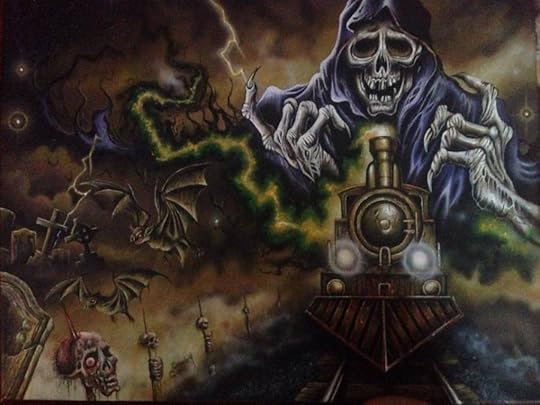 Cover art by Stephen Cooney
Cover art by Stephen Cooney
Full author list:
Roger Cowin
Charie D. La Marr
Michael Thomas-Knight
Mark Rigney
Stephen Alexander
Mike Jansen
Justin Hunter
Mary Genevieve Fortier
Jeremy Mays
Murphy Edwards
Dennis Banning
Brigitte Kephart
Brian Barnett
Mathias Jansson
Abdul-Qaadir Taariq Bakari-Muhammad
Aaron Besson
Stephen Alexander
Jim Goforth
Dona Fox
Tony Bowman
Rie Sheridan Rose
Dale Hollin
David S. Pointer
Stuart Keane
William Cook
Shenoa Carroll-Bradd
Stephen Alexander & Roger Cowin
A. P. Gilbert
Shane Koch
William F. Nolan
Teri Skultety
E.S. Wynn
Lori R. Lopez
Thomas M. Malafarina
Leigh M. Lane
Alex S. JohnsonPlus Dedications and Appreciations by Keene and Grabowski
TRAILER
Terror Train is a wonderful collection full of great stories and poetry. You’ll be happily frightened as you ride the rails. As one of the author’s recently said “It’s a ride that’s to die for”.
ALTERNATE VERSION OF BOOK DESCRIPTION (NOT THE ONE ON AMAZON)
Terror Train is the creative brainchild of A. Henry Keene. The train leaves the station noir-style in New York and travels across the country until it stops in a California of the future. In between it stops in several states including Tennessee, Missouri, and Louisiana. At every stop there is a different tale of murder, ghosts, demons, and other horrors. There are tales of love gone wrong, twisted demon-possessed trains, a vampire story that is nothing like any vampire story you’ve ever read, and many other fun terrors. And the legendary William F. Nolan has humbled us with his gracious contribution. Along with the stories there are wonderful poems spread throughout this collection by some truly talented poets. Trust me, this is a ride you won’t soon forget.
LINKSUS LINK http://www.amazon.com/Terror-Train-Mathias-Jansson-ebook/dp/B00KYWRWS2/ref=la_B00HXO3FRG_1_3?s=books&ie=UTF8&qid=1402746042&sr=1-3
UK LINK http://www.amazon.co.uk/Terror-Train-Mathias-Jansson-ebook/dp/B00KYWRWS2/ref=sr_1_1?s=digital-text&ie=UTF8&qid=1402748251&sr=1-1&keywords=terror+train
https://www.goodreads.com/book/show/22457461-terror-train?from_search=true
Published on June 29, 2014 18:01
June 19, 2014
Music for Writing Dark Fiction
Recently I asked my author pals on Facebook for recommendations of “creepy, haunting classical music.” The following list is the best of the recommendations I received, along with some of my own favorites. While some have operatic elements, it was mainly the haunting melodies and invocation of atmospheric qualities I was looking for to inspire the writing of a ghost story. That story ended up being 'Dead and Buried' which is included in my collection 'Dreams of Thanatos.' I usually have some music in the background when writing, especially atmospheric classical tunes with a gothic flavor. Hopefully you will find some new music here you have not heard before. Hell, it may even inspire you to write something suitably dramatic and haunting. Enjoy.
Camille Saint-Saëns - Danse Macabre
Mozart - Requiem
György Ligeti - Requiem
Le'rue Delashay - Through The Valley Of Death
Liszt/Leibowitz/London Philharmonic - Mephisto Waltz
Mussorgsky - Night on the Bare Mountain (Original Version)
Henryk Mikolaj Gorecki - Symphony No 3
God of War II - Complete Soundtrack
Beethoven - 7th Symphony/2nd movement
Berlioz - Symphonie Fantastique, 4/5
Frederic Chopin - Piano Sonata No. 2, 3/3
Chopin - Nocturne op.9 no.1
Liadov - Babi Yaga
Gustav Mahler - Symphony No.7 in E-minor - II, Nachtmusik
Sibelius - The Swan of Tuonela
Mendelssohn - Hebrides Overture (Fingal's Cave) (Abbado)
Mahler - Symphony No.2 in C minor "Resurrection"
Franz Liszt - Totentanz (piano and orchestra)
Jerry Goldsmith - The Haunting Suite
Sibelius - Tapiola ( Full ) - BPO / Karajan
Prokofiev: Suite Scythe - 2. The Evil God and the Dance of the Pagan Monsters
Rachmaninoff - Isle of the Dead
Camille Saint-Saëns, Rachmaninoff, Prokofiev, Sibelius, Jerry Goldsmith, Franz Liszt, Mendelssohn, Horror, Writing, Dark Fiction, William Cook, Dreams of Thanatos, Gustav Mahler, Liadov, Frederic Chopin, Berlioz, György Ligeti, God of War, Mozart, Le'rue Delashay, Mussorgsky, Henryk Mikolaj Gorecki, Beethoven, Classical, Gothic, Music
Published on June 19, 2014 18:12
June 13, 2014
Serial Killer Quarterly - a new magazine from Grinning Man Press
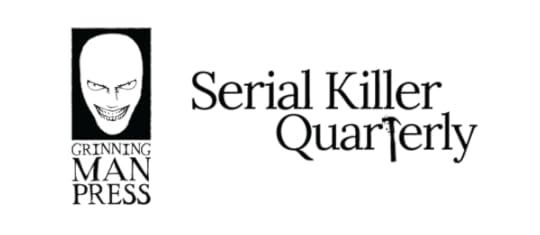
Whatever you might think about serial killers and the vile deeds they do, there is no denying the morbid fascination they induce with their repugnant personalities and the bizarre (and often quite ordinary) reasons behind their abhorrent actions. The thing that continues to fascinate readers of true crime and global media networks is that these criminal monsters are on the outside everyday people like you and I. It is the mystery and the perversity of their inner worlds that marks them as objects of interest to amateur 'arm-chair' psychologists and detectives.
As an author who has dealt with this subject matter in my own work ('Blood Related') I did countless hours of research into both real true-crime cases and fictional accounts of serial killers. With the publication of my book and the subsequent interest in it from the reading community at large, I have also had occasion to rub shoulders with other authors who share the same morbid curiosity about these creeps. Indeed, the archetypal serial killer protagonist has become a common trope across Thriller, Action and Horror genres with no signs of abatement to date. I met Lee Mellor, the co-creator of the magazine - Serial Killer Quarterly, online through a mutual project and have stayed in touch ever since. Lee is an interesting chap and has some intelligent and profound insights into his chosen fields of study. Before you read the interview below that Katherine Ramsland has kindly given me permission to share, here is some information about Lee Mellor - a talented writer and musician and the creator of Serial Killer Quarterly.
WHO IS LEE MELLOR?
Lee Mellor is a published author, musician, and doctoral student currently based out of Montreal. Lee's books, Cold North Killers: Canadian Serial Murder (2012) and Rampage: Canadian Mass Murder and Spree Killing (2013) focus on the underexplored topic of multicide in Canada. Both are available in the True Crime section of most Canadian bookstores, and in hard copy and e-book form through www.amazon.com (USA), www.amazon.ca (Canada), and www.amazon.co.uk (United Kingdom).
Until his career as an author took off, Lee devoted a great deal of time to writing, performing, and recording storytelling music. He was voted among the Top Ten Singer-Songwriters in Montreal three years in a row, and in 2008 ranked #3 next to Leonard Cohen and Rufus Wainwright. His first album Ghost Town Heart (2007) was considered one of the best “country” albums of the year by numerous indie publications and reviewers, and is notable for the songs “Liberty Street” and ”Nowhere, Manitoba.” After some soul searching, in 2011, Lee recorded ten more tracks for his second album Lose - a low key release, with the title track and “Suzy Blue Eyes” being two of the more popular tunes.
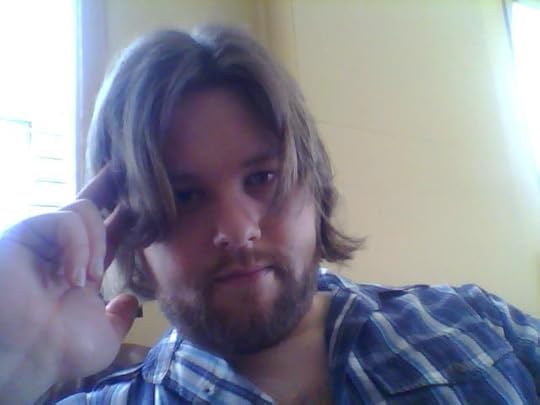
Lee also conducts historical and criminological research for several television programs.

After obtaining his Bachelor of the Arts in 2009, Lee relocated back to Brighton, ON, where he began work on his second album and first book. Originally, he had intended to write a fictional novel about a criminal profiler who tracked serial killers in Canada. Upon realizing that he was only aware of three Canadian serial murderers, Lee began researching the topic in order to avoid unintentionally copying a real life Canadian killer in his novel. Along the way, he became so fascinated by the secret history of serial homicide in the great white north that Lee decided he would write a non-fiction book about the subject.
In 2011, Lee's book Cold North Killers: Canadian Serial Murder was picked up by Dundurn Press, and published in March 2012. Dundurn asked him to write a second, Rampage: Canadian Mass Murder and Spree Killing , which he completed in early October. Both books are available to purchase through most major book retailers and Amazon.

Recently, Lee has entered a PhD program at Concordia University to pursue his academic interest in multiple murderers and sex offenders. Stay in touch with Lee and his various ongoing projects via the links below.
Contact Lee Facebook – Cold North Killers
Facebook – Rampage
Facebook – Lee Mellor’s music
Twitter – @leemellorwriter
Blog – http://mellortalksmurder.blogspot.com
Lee Mellor interview by Katherine Ramsland. A new digital quarterly on serial murder promises to entertain but also educate.
February 1, 2014 by Katherine Ramsland, Ph.D. in Shadow Boxing
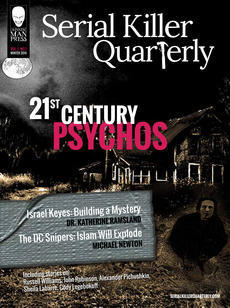
One of my colleagues, Lee Mellor, got it into his head that someone needed to create a quarterly magazine devoted exclusively to serial murder. So, he did it, and it’s a stunner. Beautifully designed, this debut issue features case histories written like short stories of such people as Col. Russell Williams and the enigmatic Israel Keyes. Lee, the editor-in-chief, even wrote a feature about the final words and meals of these offenders.
I asked Lee some questions, which he graciously answered below:
1. Please describe the concept for Serial Killer Quarterly and tell us what's in the first issue.
Serial Killer Quarterly is an e-magazine, the first publication by Grinning Man Press. This issue includes the killers you named above, plus the DC Snipers and the Internet's first serial killer, John Edward Robinson. We've also included some lighter sections to break things up, such as “Killer Flicks,” where we review films featuring real or fictional serial murder cases. Mr. Brooks is in the hot-seat this quarter.
2. What motivated you to found this magazine?
I was inspired by the true crime/detective magazines of the twentieth century. Though popular in the first half of the century, by the 1970s, most had been forced out of print due to the high overhead costs of printing and distribution, along with competition from television and cinema. With the advent and increasing popularity of electronic books, Grinning Man Press wants to take advantage of the lower cost of e-publishing to resurrect the genre. We’re focusing exclusively on serial murder cases due to the immense and enduring public interest in the topic. Research has shown that 40% of true crime publications feature cases of serial killing.
That said, there were some elements of earlier true crime magazines that we do not wish to replicate. One example is the ubiquitous cover illustrations of scantily clad women being bound and gagged by hulking males. Not only are these images dangerously misogynistic and insulting to our female readers but many serial killers have admitted to having used them pornographically in late childhood and adolescence.
The last thing Grinning Man wants to do is foster a new generation of Ted Bundys, so we take a more subtle, ominous approach to our illustrations. For example, “21st Century Psychos” features an image of Alaskan serial killer Israel Keyes unearthing his “hit kit” on a moonlit night. We've also replaced the earlier magazine's tacky bright colors with a grittier more noir aesthetic.
3. What’s your vision for it?
Artistically, we aim to bring our readers nail-biting true life page turners that make for compelling reads without resorting to sensationalism. For readers who are interested in criminal psychology or criminology, we have also included a number of sidebars with descriptions of concepts such as psychopathy, sexual sadism, victimology, etc. However, this content is supplementary, and readers who are simply interested in a gripping story can ignore it. So the magazine is both entertaining and educational.
Also, I think there is a certain unwarranted stigma attached to reading true crime publications. Where I personally don't mind sitting on the subway thumbing through a paperback on Richard Ramirez (great way to stop people from sitting beside you), I feel that a lot of curious readers are very self-conscious about how this would be perceived. By bringing true crime to our readers' tablets, laptops, cell phones, and e-readers, they can enjoy this genre in public without having to worry about being unfairly judged by workmates or fellow commuters.
4. You're laying out some issues by themes. What can we expect in the near future?
This year's line-up is already finalized, and I am incredibly excited about it. Following our Winter 2014 issue “21st Century Psychos,” will be “Partners in Pain.” This issue focuses on serial murderers who kill in teams, including male-male couples (Burke & Hare/Duffy & Mulcahy/Lake & Ng), male-female (Clark & Bundy/Bernardo & Homolka), female-female (Golay & Rutterschmidt), and murderous teams of three or more people (Corll, Henley, and Brooks).
Issue #3, “Unsolved in North America,” will be published in the summer of 2014, with features on the "Servant Girl Annihilator" by the legendary Harold Schechter, with whom I had the pleasure to dine in NYC last summer, and Michael Newton's look at the compelling case of the "Cleveland Torso Murderer," which left a black stain on the career of the celebrated detective Eliot Ness.
The year will end with Fall 2014's “Cruel Britannia” – an issue devoted to British serial killers. Burl Barer will write a feature piece on the infamous “Yorkshire Ripper” Peter Sutcliffe, Carol Anne Davis returns with a story about the grotesque Robert Napper ripper-murders, and you’ll be there with the horrific crimes and philosophies of “Moors Murderers” Ian Brady and Myra Hyndley.
5. What fresh angle on the topic does your publication bring?
As Serial Killer Quarterly is an electronic publication which can reach the world, we're striving to build a magazine which truly reflects and respects our international readership. By the end of the year we will have featured killers from the United States, Canada, England, Scotland, Russia, and Mexico. So we're hoping to broaden our reader's knowledge of multiple murder as a truly international phenomenon.
We will hold off on the more notorious cases until at least 2015, as Bundy, Dahmer, Gacy, Gein and Jack the Ripper have already been done to death (no pun intended). Serial Killer Quarterly will present cases that are equally as fascinating, but have, for whatever reason, flown under the radar of the general public.
END
About Grinning Man Press:
Grinning Man Press is an e-publishing company founded in 2013 by Lee Mellor (author of Cold North Killers and Rampage) and his long-time friend, Aaron Elliott. Through the advent of .PDF publications, we seek to resurrect popular fiction and detective magazine formats from the early-mid 20th century, allowing a new audience to enjoy them on their computers, tablets, smartphones, or Kindle readers.
We are proud to feature articles and stories by world-class authors such as Harold Schechter, Katherine Ramsland, and Michael Newton.
Grinning Man operates on one principle: if it’s creepy, dark, disturbing, outlandish, macabre or unsettling, we print it. Currently, Grinning Man’s sole publication is the nail-biting Serial Killer Quarterly – a gripping True Crime e-mag featuring real cases of serial killing from around the globe. Our 2014 line-up consists of:
Winter 2014: 21st Century Psychos – Katherine Ramsland, Michael Newton, Lee Mellor
Spring 2014: Partners in Pain - Cathy Scott, Katherine Ramsland, Carol Anne Davis
Summer 2014: Unsolved in America – Harold Schechter, Michael Newton
Fall 2014: Cruel Britannia – Burl Barer, Carol Anne Davis, Katherine Ramsland
In the near future, GMP plan to launch magazines on the paranormal, along with fiction mags featuring serials in the genres of sci-fi, horror, fantasy, mystery and erotica. For more info, please contact them.
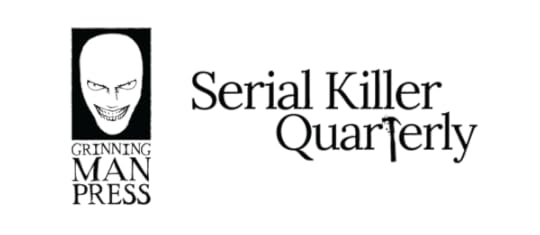
Katherine Ramsland, Peter Vronsky, Michael Newton, Lee Mellor, Grinning Man Press, Serial Killer Quarterly, Serial Killers, Serial Killer, True Crime, Interview, Article, Harold Schechter
Published on June 13, 2014 17:23
June 10, 2014
Academic review of Stanley Fish's 'Professional Correctness: Literary Studies and Political Change'
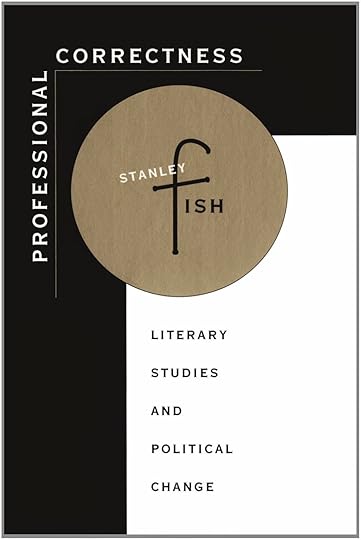
In his book, Professional Correctness: Literary Studies and Political Change"Justifications, however, are never available from the outside . . . when all is said and done, there is no reason for any discipline or enterprise to exist except for what is brought into the world by the possibility of its practice. What you gain by maintaining an enterprise is the very special and specific pleasures and consolations it affords. They should be thought of neither as the vehicles of our salvation nor as obstacles to it; they are what they are and so are we (140-141)."
While I agree that there are ‘pleasures and consolations’ gained from maintaining disciplines as they are and have been, I disagree that we can dismiss the changing nature of the world outside, and its effect upon, the institution of education. Society’s ever increasing reliance on tertiary qualifications, as an entry into the world of employment, negates the statically staunch position of academics such as Fish. If his only justification for the discipline of literary criticism, to continue operating as such, is that it is for personal and consolatory purposes, then this in my opinion is a weakness in his critique of other disciplinary aspirations that do take these factors into account. Within Professional Correctness, there is a definite feeling of reproachfulness, toward cultural studies critique that appears to disrespect, or resent, literary studies as a distinctive and socially viable discipline. Through the power of persuasion, Fish subtly uses this apparent lack of respect, to mark those proponents of cultural studies, as without integrity and principles of true cultural tolerance toward other disciplines and therefore other cultures. This affront, that Fish consistently emphasises, has the effect of rendering the project of ‘true’ cultural studies potentially null and void. This insight into the core and guiding principle of cultural studies, being that of tolerance, provides Fish with the ammunition to fortify the integrity and validity of his own discipline. His position is validly strong and poignantly essential to his critique, of the epistemological and political aspirations of cultural studies, as a distinct discipline. While there is obvious strength and logic, to this underlying critique of cultural studies fidelity to itself, it also shows how analytically devoid of moral principles literary criticism can be.
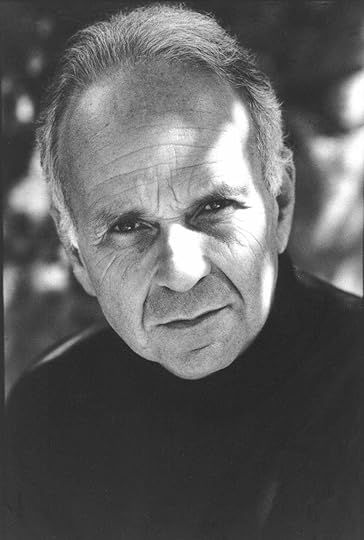 Stanley FishFish weakens his critics by asserting his strength as a literary critic. This effectively deprives them of a vocabulary through which they might lodge their objections or reservations to his arguments. To refute a critic’s claims, Fish discovers the term or concept the critic is using as the foundation for their assumptions. He then implies that the term or concept has been unjustifiably privileged (or appropriated) and accorded, a normative status that it can not possess outside of its discipline. The cultural studies critic, who uses literary terms to criticise Fish, or the discipline of literary studies, soon falls prey to the strength of this destabilising technique Fish employs. He uses his authority as a master of language and literary technique to silence the critic, making them seem ignorant of their own linguistic and theoretical arguments and positions within a given cultural context. Their silence is left to be construed (there are not many options) as the result of unfounded presuppositions and assumed knowledge concerning the nature of disciplines. While this technique of Fish’s is strong as a critical manoeuvre, it has the weakening effect of giving him an air of arrogance and elitism. It also implies that if there is to be any criticism directed at him, then it must come from within his own camp, from those who are able to battle with words as effectively and mercilessly as he. To justify and assert the strength of his discourse (and discipline) in opposition to cultural studies criticism, Fish pulls rank and reinforces his positions with a bombardment of literary critique. This manoeuvre is tactical in that it its use of language and rhetorical skill forcefully shows the power and distinct nature of literary criticism (contrasted with the essentially non-specific ‘discipline’ of cultural studies). We, the reader, are forced to participate in the complex, and differently distinct, practice (from that of cultural studies) of literary interpretation. Before we know it, we are nodding our heads to the beat of Fish’s ‘game’. His arguments lead us to the end of each chapter, reduced to agreement or disagreement about literary theory’s viability as a discipline. This tactic places the reader as an ally or an enemy, intelligent or illiterate. It is hard not to be persuaded by the sound logic of Fish’s reasoning, after all, who wants to think of themselves as an enemy of anything or an illiterate? More often than not, agreement is our intended and skilfully pre-planned destination.In my opinion, Fish’s position is consistent and logically strong, his only weakness so far found is when he leaves the realm of literary criticism and academic rhetoric, to assert (however subtly) his qualification of ‘professional correctness’. Contradictions are few, but when they do occur, they show Fish’s human imperfection in almost a sacrificial manner. Sacrificial in the sense that it feels almost deliberate in light of the strength of the rest of the work. His critique shows this weakness in his apparent indifference to modern literary practice and academic teaching (e.g. the influence of cultural studies). He makes no attempt to convince cultural studies critics of his sincerity and honesty in criticising their cause, even after he has allied his ‘professional correctness’ with their ‘political correctness’: ’’do not read this as a repudiation of cultural studies, black studies, feminist studies, gay and lesbian studies, and other forms of activity that have reinvigorated the literary scene’’(x, preface). Fish, essentially, allows no compromise on his ideal of the discipline of literary criticism. As he approaches the climax of his argument, Fish explains the title (of chapter V) as follows: "literary interpretation, like virtue, is its own reward. I do it," he says provocatively, "because I like the way I feel when I'm doing it" (110). There is no doubting Fish’s passion for his craft, but the intent behind his self-justification is immediately questionable. The confessional tone, at first, seems only to convey an insight into Fish’s conviction and faith to his discipline. However, there is also another effect produced, which I feel was Fish’s intention behind his justification: to pitch legitimating talk at the level of personal enjoyment serves to differentiate between subjects of belief and conviction. Displaying one’s personal preference and reason(s) for disciplinary practice, implies that those who do not have the same emotional involvement with their respective disciplines (cultural studies for example) are not as committed due to their lack of public faith in what they pursue. This tactic of Fish’s questions the strength of the beliefs of those who don’t exhibit the same apparent pride in their given professions. It is as if by not confessing their allegiance and patriotism to their discipline, they are less than qualified to pass judgement (and justification) on their own profession, let alone criticising literary interpretation and theory. Both the tone and the introductory last line that seems (contextually) as much a question as it is an answer: ‘how difficult it is to tell the difference between devils and deities’ (110). When combined, with Fish’s emotional and ‘self-referential’ tirade in the following paragraph, makes the reader reel in shock and moral incredulity at an intimacy bordering on the verge of eroticism. This tone of almost aloof expressionism and romantic semantics betrays (seemingly) overwhelming modesty and confidence, potentially frightening and somewhat radically strange to prospects of the discipline. There is a sense of ‘been there, done that’ in the paragraph, that would seem totally foreign to a younger academic whose literary aspirations and skills are just developing. A definite love of poetry would also seem to be a pre-requisite of a prospective literary interpreter, judging from the lasting impression of Fish’s desideratum. I do not suggest that expressing and maintaining faith and personal preference is a non-essential ingredient, in the continued and deliberate participation of literary criticism (or in any field of interest, academic or otherwise). However, Fish’s position as a repudiated literary theorist and critic, and the professionalism of the work in question, makes me ask why has he so provocatively posed and adopted this confessional rhetoric? Is he merely giving a reason as to why he does what he does? Is he trying to convince prospective members of his discipline (students) to join in the fun; does he use this rhetoric to make him more human and us more sympathetic to his views? Is he petitioning solidarity from comrades in arms fighting the common good fight? To these questions, there seems no concrete answer and we can only assume that what Fish tells us is sincere. In light of the weight of the rest of Fish’s discourse, the effect of this seemingly deliberate abatement places the astute reader in the position of questioning the intent behind it.As someone who agrees with the emotions and experience that literary criticism gives, as related by Fish, I can also say that the reasons he gives do encourage me to continue within the discipline. As a form of ‘public justification’, I am unsure as to whether Fish has effectively used this part of his discourse to do so, or whether it is just to provide the reader with a topic of conversation. Whether it portrays an eccentric whose fetishistic leanings point to an unnatural desire to fornicate with words, seems too base a thought to even consider. Although I must admit, I entertained the idea with a certain amount of unintended and perplexed imagination. As a form of ‘public justification’, Fish contradicts his assertion that the public or “those not of our party’’(115), do not have anything to gain from literary criticism. If there is such an obvious pleasure principle, involved in practicing criticism, that is only ‘internal’ to itself, then it would follow that it cannot also be relevant to any ‘external’ public justification. So why then, does Fish waste time justifying it as such? Moreover, if it were relevant, externally to the discipline, then it would mean that the public does have something to gain from literary criticism. This weakness in Fish’s argument seems to me to be a direct result of his overuse of rhetoric in order to persuade or justify his position to a public audience. In Aristotle’s Rhetorica, he (Aristotle) states that “we must use, as our modes of persuasion and argument, notions possessed by everybody . . . when dealing with the way to handle a popular audience’’ (I.I.26-29). Fish subtly dismisses the need to justify literary criticism to the public with his argument against interdisciplinarity and his definition of a discipline, as essentially no less than ‘a law unto itself’. His argument does not leave us (as the judge of his work) with many matters of decision; he uses the principles of rhetorical persuasion in such a way that we are lead to conclusions almost involuntarily. The ease by which he establishes apparently watertight statements of fact, lead us to agree (in most instances) that the truth of his critique is as he maintains it is. This is one of the greatest strengths behind his arguments against cultural studies aspirations. Similarly, it can be interpreted in a negative way, as being manipulative and beguiling in nature, in order to bring the reader around to a point of agreement with the author. In summary, due to the strength of Fish’s critique of the epistemological and political aspirations of cultural studies, I agree that literary criticism is essentially non-causal toward political and social change. However, the fact that literary criticism has generated so much debate within the academies, seems to me an example of how a discipline can influence and generate changes within the institution and therefore within the discipline itself. Due to the apparent weaknesses that I have pointed out, I have to conclude that I am not fully convinced of the strength of Fish’s ‘public justification’ of literary criticism as a discipline.
Stanley FishFish weakens his critics by asserting his strength as a literary critic. This effectively deprives them of a vocabulary through which they might lodge their objections or reservations to his arguments. To refute a critic’s claims, Fish discovers the term or concept the critic is using as the foundation for their assumptions. He then implies that the term or concept has been unjustifiably privileged (or appropriated) and accorded, a normative status that it can not possess outside of its discipline. The cultural studies critic, who uses literary terms to criticise Fish, or the discipline of literary studies, soon falls prey to the strength of this destabilising technique Fish employs. He uses his authority as a master of language and literary technique to silence the critic, making them seem ignorant of their own linguistic and theoretical arguments and positions within a given cultural context. Their silence is left to be construed (there are not many options) as the result of unfounded presuppositions and assumed knowledge concerning the nature of disciplines. While this technique of Fish’s is strong as a critical manoeuvre, it has the weakening effect of giving him an air of arrogance and elitism. It also implies that if there is to be any criticism directed at him, then it must come from within his own camp, from those who are able to battle with words as effectively and mercilessly as he. To justify and assert the strength of his discourse (and discipline) in opposition to cultural studies criticism, Fish pulls rank and reinforces his positions with a bombardment of literary critique. This manoeuvre is tactical in that it its use of language and rhetorical skill forcefully shows the power and distinct nature of literary criticism (contrasted with the essentially non-specific ‘discipline’ of cultural studies). We, the reader, are forced to participate in the complex, and differently distinct, practice (from that of cultural studies) of literary interpretation. Before we know it, we are nodding our heads to the beat of Fish’s ‘game’. His arguments lead us to the end of each chapter, reduced to agreement or disagreement about literary theory’s viability as a discipline. This tactic places the reader as an ally or an enemy, intelligent or illiterate. It is hard not to be persuaded by the sound logic of Fish’s reasoning, after all, who wants to think of themselves as an enemy of anything or an illiterate? More often than not, agreement is our intended and skilfully pre-planned destination.In my opinion, Fish’s position is consistent and logically strong, his only weakness so far found is when he leaves the realm of literary criticism and academic rhetoric, to assert (however subtly) his qualification of ‘professional correctness’. Contradictions are few, but when they do occur, they show Fish’s human imperfection in almost a sacrificial manner. Sacrificial in the sense that it feels almost deliberate in light of the strength of the rest of the work. His critique shows this weakness in his apparent indifference to modern literary practice and academic teaching (e.g. the influence of cultural studies). He makes no attempt to convince cultural studies critics of his sincerity and honesty in criticising their cause, even after he has allied his ‘professional correctness’ with their ‘political correctness’: ’’do not read this as a repudiation of cultural studies, black studies, feminist studies, gay and lesbian studies, and other forms of activity that have reinvigorated the literary scene’’(x, preface). Fish, essentially, allows no compromise on his ideal of the discipline of literary criticism. As he approaches the climax of his argument, Fish explains the title (of chapter V) as follows: "literary interpretation, like virtue, is its own reward. I do it," he says provocatively, "because I like the way I feel when I'm doing it" (110). There is no doubting Fish’s passion for his craft, but the intent behind his self-justification is immediately questionable. The confessional tone, at first, seems only to convey an insight into Fish’s conviction and faith to his discipline. However, there is also another effect produced, which I feel was Fish’s intention behind his justification: to pitch legitimating talk at the level of personal enjoyment serves to differentiate between subjects of belief and conviction. Displaying one’s personal preference and reason(s) for disciplinary practice, implies that those who do not have the same emotional involvement with their respective disciplines (cultural studies for example) are not as committed due to their lack of public faith in what they pursue. This tactic of Fish’s questions the strength of the beliefs of those who don’t exhibit the same apparent pride in their given professions. It is as if by not confessing their allegiance and patriotism to their discipline, they are less than qualified to pass judgement (and justification) on their own profession, let alone criticising literary interpretation and theory. Both the tone and the introductory last line that seems (contextually) as much a question as it is an answer: ‘how difficult it is to tell the difference between devils and deities’ (110). When combined, with Fish’s emotional and ‘self-referential’ tirade in the following paragraph, makes the reader reel in shock and moral incredulity at an intimacy bordering on the verge of eroticism. This tone of almost aloof expressionism and romantic semantics betrays (seemingly) overwhelming modesty and confidence, potentially frightening and somewhat radically strange to prospects of the discipline. There is a sense of ‘been there, done that’ in the paragraph, that would seem totally foreign to a younger academic whose literary aspirations and skills are just developing. A definite love of poetry would also seem to be a pre-requisite of a prospective literary interpreter, judging from the lasting impression of Fish’s desideratum. I do not suggest that expressing and maintaining faith and personal preference is a non-essential ingredient, in the continued and deliberate participation of literary criticism (or in any field of interest, academic or otherwise). However, Fish’s position as a repudiated literary theorist and critic, and the professionalism of the work in question, makes me ask why has he so provocatively posed and adopted this confessional rhetoric? Is he merely giving a reason as to why he does what he does? Is he trying to convince prospective members of his discipline (students) to join in the fun; does he use this rhetoric to make him more human and us more sympathetic to his views? Is he petitioning solidarity from comrades in arms fighting the common good fight? To these questions, there seems no concrete answer and we can only assume that what Fish tells us is sincere. In light of the weight of the rest of Fish’s discourse, the effect of this seemingly deliberate abatement places the astute reader in the position of questioning the intent behind it.As someone who agrees with the emotions and experience that literary criticism gives, as related by Fish, I can also say that the reasons he gives do encourage me to continue within the discipline. As a form of ‘public justification’, I am unsure as to whether Fish has effectively used this part of his discourse to do so, or whether it is just to provide the reader with a topic of conversation. Whether it portrays an eccentric whose fetishistic leanings point to an unnatural desire to fornicate with words, seems too base a thought to even consider. Although I must admit, I entertained the idea with a certain amount of unintended and perplexed imagination. As a form of ‘public justification’, Fish contradicts his assertion that the public or “those not of our party’’(115), do not have anything to gain from literary criticism. If there is such an obvious pleasure principle, involved in practicing criticism, that is only ‘internal’ to itself, then it would follow that it cannot also be relevant to any ‘external’ public justification. So why then, does Fish waste time justifying it as such? Moreover, if it were relevant, externally to the discipline, then it would mean that the public does have something to gain from literary criticism. This weakness in Fish’s argument seems to me to be a direct result of his overuse of rhetoric in order to persuade or justify his position to a public audience. In Aristotle’s Rhetorica, he (Aristotle) states that “we must use, as our modes of persuasion and argument, notions possessed by everybody . . . when dealing with the way to handle a popular audience’’ (I.I.26-29). Fish subtly dismisses the need to justify literary criticism to the public with his argument against interdisciplinarity and his definition of a discipline, as essentially no less than ‘a law unto itself’. His argument does not leave us (as the judge of his work) with many matters of decision; he uses the principles of rhetorical persuasion in such a way that we are lead to conclusions almost involuntarily. The ease by which he establishes apparently watertight statements of fact, lead us to agree (in most instances) that the truth of his critique is as he maintains it is. This is one of the greatest strengths behind his arguments against cultural studies aspirations. Similarly, it can be interpreted in a negative way, as being manipulative and beguiling in nature, in order to bring the reader around to a point of agreement with the author. In summary, due to the strength of Fish’s critique of the epistemological and political aspirations of cultural studies, I agree that literary criticism is essentially non-causal toward political and social change. However, the fact that literary criticism has generated so much debate within the academies, seems to me an example of how a discipline can influence and generate changes within the institution and therefore within the discipline itself. Due to the apparent weaknesses that I have pointed out, I have to conclude that I am not fully convinced of the strength of Fish’s ‘public justification’ of literary criticism as a discipline.
[1] Professional Correctness: Literary Studies and Political Change, by Stanley Fish (Oxford: Clarendon Press, 1995.)
(C) William Cook. 2014.
Stanley Fish, Literary Criticism, Professional Correctness: Literary Studies and Political Change, Academic Essay, Essay, Rhetoric, University, William Cook
Published on June 10, 2014 18:34
May 26, 2014
End of May . . . New Poetry Collection + slacker apology
Starting to get cold here in Wellington. The Southerly winds are bitterly swept forward by 120-30 kilometer-an-hour winds. Tonight is quiet after a stormy couple of days, perfect for a quick blog post. For those of you who sometimes read this I apologize for my lack of posts/communication lately. Sometimes life gets in the way and I've been quite busy. Since the last post, my new collection of poetry has been published by James Ward Kirk Fiction, a small Independent publisher in the U.S. (Indiana).
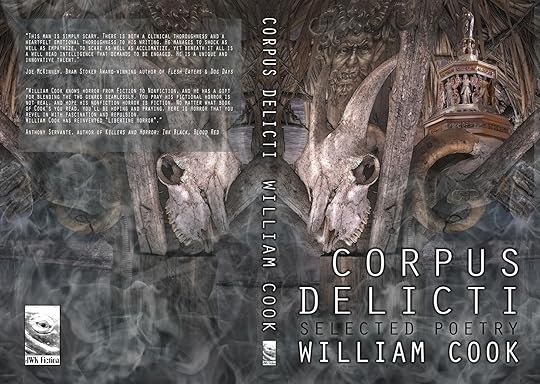
'Corpus Delicti' is a collection spanning two-decades of material, carefully selected and revised (some) with much new material; 290 pages of dark philosophical verse. BE WARNED: my poetry does deal with dark, often taboo, subjects and language - as such, you have been forewarned. Please keep in mind that my poetry tells a story as a fiction more often than not. My poetry expresses my thoughts, and it would be safe to assume that I speak from experience or have some bias towards the words I choose to employ, for they are my thoughts - but like everything, influence pervades, as much as words are shared.
I have probably said enough already but I'd like to say a big thank you to my readers - I am getting frustrated with social media lately so will endeavor to be more active on the blog/website front with more posts and things of interest. Take care. Here's some other readers talking about 'Corpus Delicti' instead of me for a change [insert wink here]:
Latest Amazon review
5.0 out of 5 stars A Poet's Heart Gives a Strong Pulse to the Poetry May 25, 2014 by Anthony Servante Format: Kindle Edition
Corpus Delicti by William Cook is an extravagant challenge. It is at once an abundant selection of poems on a wide range of topics while it is also individual little gems that captivate the reader. One might say that each poem has its own job, its own vision that leads one to the next poem, and so on. If anything, its greatest feature, its size, is also my one criticism. I see three books here, a trilogy, in one volume. But that's good news for poetry fans: you get three books in one, close to two hundred pages of gems to appreciate one by one. This is not a book to devour in one sitting. It is to be savored slowly, over multiple readings, perhaps three to four poems at a time. I tried random readings and sequential readings, and both work equally fine, with only a subtle difference in reading experience. It is not often that a book of such magnitude of thought and word reaches the modern reader. Purchase Corpus Delicti with confidence that you will have a year's worth of reading joy and introspection. And if you come to read William Cook from his fictional work, then you are in for a treat. Fans of Blood Related can enjoy these little intellectual challenges to the mind in the same way we enjoyed Cook's toying with the line between fiction and nonfiction with his serial killers in Blood Related. The pulse of poetry is as strong as the poet's heart in this very large compilation of poems.
Anthony Servante wrote this review and I'm very proud to have him take an interest in my work. He is an interesting chap and has a great little blog that is getting bigger by the day - fantastic articles and reviews, profiles, interviews, poetry, fiction and everything dark in-between. He is an academic fellow who has a good eye for the whole process of authorship; either verse, fiction, or non-fiction alike. He has also reviewed another poetry collection, 'Moment of Freedom' with a very insightful and erudite critique of my work:
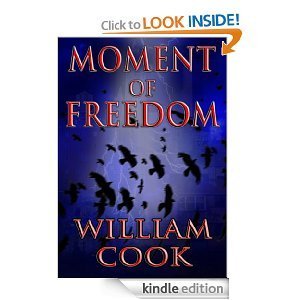
5.0 out of 5 stars The New Modernism April 1, 2013 By Anthony Servante Format:Kindle Edition[Also reviewed in the Servante of Darkness Blog]
William Cook joins the Modernism School of Poetry. From Wiki: "For the modernists, it was essential to move away from the merely personal towards an intellectual statement that poetry could make about the world." Thus William combines a writing style of prose and poetry to weave an intellectual tapestry, slipping his words in and out of subjective and objective observations, pulling and pushing the reader to envision the completed tapestry while savoring the in's and out's of the words themselves, much as we watch a movie without thinking about the camera work or actor interpretations of the screenplay. As Peter Gabriel points out in The Cinema Show regarding the use of cosmetics: "Concealing to reveal."
Let's consider the "The edge of the night" from MOMENT OF FREEDOM: Selected Poetry. First off, two notes: the title Moment of Freedom is ironic in that the title indirectly states, a lifetime of slavery to the "moment of freedom", much as the term "a cloudless clim" from Lord Byron, must incorporate "cloud" to denote an empty sky: an image to convey emptiness rather than simply using the unpoetic "empty" to state such. Second, the poem's title capitalizes the article but not the noun or prepositional phrase, combining poetic license with standard grammatical rule (namely "The", the first word in the line, must be capitalized). The intellectualizing has begun; William flaunts the world's rules by obeying them as he pleases, this, a moment of freedom.
To discuss William's deliberate misuse of grammar would be folly as it is part of the pursuit to reach the reader. Note also his use of metaphor and litotes. To say simply: "a corpse" is not in his vocabulary; he metaphorically says "dinner" and the diner, death ("the dead!"). Knowledge is life, and life is accepting death: "The darkness comes from knowing nothing is ours, except death...." The first slip into litotes comes from a shift into prose from the metaphor: "...to wake with a sore splitting back from the cold floor in borrowed clothes and eyes..." and with the "borrowed...eyes" shifts back to poetry and metaphor. These are very aesthetic acrobatics.
Furthermore, in the line "To wake up and see the sun if not the glare from beyond" we see additional shifts with the sun at once literal and figurative (as that solar body we find upon waking and as a metaphor for the afterlife). William maintains the balance between shifts throughout the work and ultimately "time" becomes a "cannibal" eating us as we sleep and wake, with varying degrees of metaphoric intents. Thus, the final line of Part II captures this fatality of cannibalism of the self as William becomes the "I" of the poem and states the thesis with the "if", bringing together the personal and the intellectual in Part III: "The science of the mind corroded the body, blinded every mile I ever burnt in this life and the next if there ever were such a thing."
A work in three parts, "The edge of the night" is representative of the poetry throughout MOMENT OF FREEDOM. Think of the book as a complete poem with each individual poem making up the whole. I do not recommend jumping around reading individual works, but rather beginning to end, as one would read James Joyce's Ulysses or William Burroughs' Naked Lunch. It is a work worthy to be mentioned with these modernist authors.
Anyway, that's pretty much the intro to my collection 'Corpus Delicti'/'Moment of Freedom.' Those of you who buy a copy - bless you and I hope you find it interesting, those of you who don't - I hope you find something else worth reading here on my blog/site. Check out the Links/Recommended pages for other horror, art and writer-related links. Until next time . . .

'Corpus Delicti' is a collection spanning two-decades of material, carefully selected and revised (some) with much new material; 290 pages of dark philosophical verse. BE WARNED: my poetry does deal with dark, often taboo, subjects and language - as such, you have been forewarned. Please keep in mind that my poetry tells a story as a fiction more often than not. My poetry expresses my thoughts, and it would be safe to assume that I speak from experience or have some bias towards the words I choose to employ, for they are my thoughts - but like everything, influence pervades, as much as words are shared.
I have probably said enough already but I'd like to say a big thank you to my readers - I am getting frustrated with social media lately so will endeavor to be more active on the blog/website front with more posts and things of interest. Take care. Here's some other readers talking about 'Corpus Delicti' instead of me for a change [insert wink here]:
Latest Amazon review
5.0 out of 5 stars A Poet's Heart Gives a Strong Pulse to the Poetry May 25, 2014 by Anthony Servante Format: Kindle Edition
Corpus Delicti by William Cook is an extravagant challenge. It is at once an abundant selection of poems on a wide range of topics while it is also individual little gems that captivate the reader. One might say that each poem has its own job, its own vision that leads one to the next poem, and so on. If anything, its greatest feature, its size, is also my one criticism. I see three books here, a trilogy, in one volume. But that's good news for poetry fans: you get three books in one, close to two hundred pages of gems to appreciate one by one. This is not a book to devour in one sitting. It is to be savored slowly, over multiple readings, perhaps three to four poems at a time. I tried random readings and sequential readings, and both work equally fine, with only a subtle difference in reading experience. It is not often that a book of such magnitude of thought and word reaches the modern reader. Purchase Corpus Delicti with confidence that you will have a year's worth of reading joy and introspection. And if you come to read William Cook from his fictional work, then you are in for a treat. Fans of Blood Related can enjoy these little intellectual challenges to the mind in the same way we enjoyed Cook's toying with the line between fiction and nonfiction with his serial killers in Blood Related. The pulse of poetry is as strong as the poet's heart in this very large compilation of poems.
Anthony Servante wrote this review and I'm very proud to have him take an interest in my work. He is an interesting chap and has a great little blog that is getting bigger by the day - fantastic articles and reviews, profiles, interviews, poetry, fiction and everything dark in-between. He is an academic fellow who has a good eye for the whole process of authorship; either verse, fiction, or non-fiction alike. He has also reviewed another poetry collection, 'Moment of Freedom' with a very insightful and erudite critique of my work:

5.0 out of 5 stars The New Modernism April 1, 2013 By Anthony Servante Format:Kindle Edition[Also reviewed in the Servante of Darkness Blog]
William Cook joins the Modernism School of Poetry. From Wiki: "For the modernists, it was essential to move away from the merely personal towards an intellectual statement that poetry could make about the world." Thus William combines a writing style of prose and poetry to weave an intellectual tapestry, slipping his words in and out of subjective and objective observations, pulling and pushing the reader to envision the completed tapestry while savoring the in's and out's of the words themselves, much as we watch a movie without thinking about the camera work or actor interpretations of the screenplay. As Peter Gabriel points out in The Cinema Show regarding the use of cosmetics: "Concealing to reveal."
Let's consider the "The edge of the night" from MOMENT OF FREEDOM: Selected Poetry. First off, two notes: the title Moment of Freedom is ironic in that the title indirectly states, a lifetime of slavery to the "moment of freedom", much as the term "a cloudless clim" from Lord Byron, must incorporate "cloud" to denote an empty sky: an image to convey emptiness rather than simply using the unpoetic "empty" to state such. Second, the poem's title capitalizes the article but not the noun or prepositional phrase, combining poetic license with standard grammatical rule (namely "The", the first word in the line, must be capitalized). The intellectualizing has begun; William flaunts the world's rules by obeying them as he pleases, this, a moment of freedom.
To discuss William's deliberate misuse of grammar would be folly as it is part of the pursuit to reach the reader. Note also his use of metaphor and litotes. To say simply: "a corpse" is not in his vocabulary; he metaphorically says "dinner" and the diner, death ("the dead!"). Knowledge is life, and life is accepting death: "The darkness comes from knowing nothing is ours, except death...." The first slip into litotes comes from a shift into prose from the metaphor: "...to wake with a sore splitting back from the cold floor in borrowed clothes and eyes..." and with the "borrowed...eyes" shifts back to poetry and metaphor. These are very aesthetic acrobatics.
Furthermore, in the line "To wake up and see the sun if not the glare from beyond" we see additional shifts with the sun at once literal and figurative (as that solar body we find upon waking and as a metaphor for the afterlife). William maintains the balance between shifts throughout the work and ultimately "time" becomes a "cannibal" eating us as we sleep and wake, with varying degrees of metaphoric intents. Thus, the final line of Part II captures this fatality of cannibalism of the self as William becomes the "I" of the poem and states the thesis with the "if", bringing together the personal and the intellectual in Part III: "The science of the mind corroded the body, blinded every mile I ever burnt in this life and the next if there ever were such a thing."
A work in three parts, "The edge of the night" is representative of the poetry throughout MOMENT OF FREEDOM. Think of the book as a complete poem with each individual poem making up the whole. I do not recommend jumping around reading individual works, but rather beginning to end, as one would read James Joyce's Ulysses or William Burroughs' Naked Lunch. It is a work worthy to be mentioned with these modernist authors.
Anyway, that's pretty much the intro to my collection 'Corpus Delicti'/'Moment of Freedom.' Those of you who buy a copy - bless you and I hope you find it interesting, those of you who don't - I hope you find something else worth reading here on my blog/site. Check out the Links/Recommended pages for other horror, art and writer-related links. Until next time . . .
Published on May 26, 2014 03:13
March 23, 2014
THE (EXTREMELY) SHORT GUIDE TO WRITING HORROR BY TIM WAGGONER
Tim Waggoner graciously let me reblog this fascinating little exploration of his on writing horror.
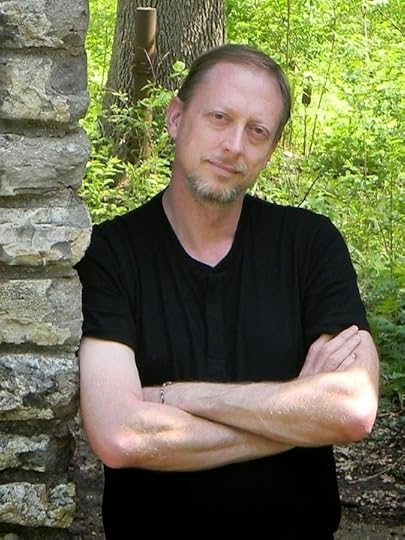 THE (EXTREMELY) SHORT GUIDE TO WRITING HORROR BY TIM WAGGONER Horror comes from a fear of the unknown. Keep a sense of mystery going in your story. What’s happening? Why is it happening? What’s going to happen next? How much worse is it going to get?
THE (EXTREMELY) SHORT GUIDE TO WRITING HORROR BY TIM WAGGONER Horror comes from a fear of the unknown. Keep a sense of mystery going in your story. What’s happening? Why is it happening? What’s going to happen next? How much worse is it going to get? Horror comes from a violation of what your characters consider to be normal reality. This violation shakes them to their very core because it raises the possibility that everything they thought they knew is wrong and that anything could happen. The Universe isn’t orderly or benign. It’s chaotic and malicious.
Dread is the mounting anticipation of a threat drawing ever closer. Terror is a deep emotional and intellectual reaction to a threat, a profound realization that reality isn’t what we thought it was. Horror is an immediate reaction to a threat – disbelief, denial, turning away. Shock is a surprise, an adrenaline rush, while Disgust is a queasy visceral reaction. Dread and Terror are the most effective weapons in a horror writer’s arsenal – they have a much greater impact on readers – but all the techniques have their strengths.
The horror equivalent of the Hero’s Journey: Some Poor Bastard’s Descent into Hell. Horror works best when it focuses on normal people (hence the “Poor Bastard”), and the characters’ situation steadily and nightmarishly worsens (the “Descent”). “Hell” can be physical, spiritual, mental, emotional, internal, external – or better yet, a combination of them all. Possible Story Outcomes with this pattern: the Poor Bastard Escapes Hell, the Poor Bastard is Eternally Damned, the Poor Bastard Escapes with Severe Wounds and Scars, the Poor Bastard is Transformed by Hell, the Poor Bastard Carries Hell With Him, the Poor Bastard Drags Other to Hell or Brings Hell to Them, and the Poor Bastard Becomes the Devil.
Horror is internal more than external. In the movie Alien, the crew of the Nostromo aren’t trained to deal with monsters, so they’re terrified. In the sequel Aliens, the space marines are trained soldiers and while they might be frightened by the monsters they face, it’s not to the same degree as the characters in the first movie. Alien is a horror film because of the characters’ internal reaction to events. Aliens is an action movie because of how the characters in that film react. Write with a close point of view to show your characters’ emotional reaction to events in order to create effective horror.
Give readers characters they care about. Horror stories aren’t about the monster. They’re about how people react to the monster. (Or in some cases, react to becoming monsters.) If readers care about your characters, if they empathize with them, then the threats these characters face will be meaningful to readers. If your characters are the equivalent of video game avatars with no personality, the threats they face will be meaningless to readers.
Respect your characters – all of them. In horror, sometimes a character’s only function is to die in order to establish how serious the threat is and build suspense. Even if these characters only have a short time on stage, give them their dignity. For the brief time that they appear, try to present them as full, rich characters as much as possible. This will increase your reader’s emotional involvement in the story and make the threat seem even worse.
Avoid clichés. Horror is about the unknown, and once a specific type of character, threat, or story structure becomes too familiar, it loses its power to engage and affect readers – especially in horror.
Make your horror personal. Draw from your own experience, observations, and fears to create horror only you can write – horror that’s yours and no one else’s.
Take new approaches to old archetypes. Instead of writing about a classic vampire, rework that trope. Put a new spin on it. For example, vampires drain lifeforce from their victims. So what if there was a creature that injected lifeforce into its victims? Perhaps the souls of people that have died, souls that eventually try to gain control of their new hosts. Instead of people spending the night in a haunted house, what if the house was broken into hundreds of pieces, and each piece was given to a different person? This way, the haunting comes to them.
There are no limits, but horror elements should serve the story and the characters’ journey. You don’t want your stories to be the equivalent of a simple walk through a carnival spook house, no matter how grotesque and bizarre the attractions inside may be. Character and story come first. After that, your tale can be as weird and extreme as you want to make it.
Physical pain is easy – too easy. In horror, characters are often under the threat of physical violence, injury, and ultimately death. But the mental, emotional, and spiritual wounds characters suffer can be far worse than mere physical pain. Make sure that death isn’t the worst thing that can happen in your horror – not by a long shot.
Don’t save the best for last. In “The Body Politic,” Clive Barker takes the old horror trope of the living severed hand that’s out for revenge and puts a new spin on it. Normally, stories using this trope end with the hand of a dead person returning to enact revenge on its murderer. “Oh my God, the hand is alive!” In “The Body Politic,” Barker begins with the premise that our hands – all of them – have separate lives and personalities, and they wish to be free from “the tyranny of the body.” Barker didn’t save his best idea for last. He began with his best idea and kept going from there. You should do the same.
How you write is just as important as What you write. Example Version 1: There was a monster outside the front door. A man opened the door and the monster ate him. Example Version 2: Bob had his hand on the knob, was just about to turn it, open the door, and walk outside to check the mail, when he felt the metal vibrate beneath his flesh. Not much, just a little. But it made him think that someone on the other side had put their hand on the outside knob, making it jiggle the tiniest bit. And was the metal starting to feel colder, as if a silent arctic wind caressed the knob outside? It was a ridiculous thought, but he removed his hand from the knob all the same and, without realizing it, took two steps backward. The way you tell your story is just as important, if not more so, than the kind of story you’re trying to tell. This is true with any type of fiction, but it’s especially true in horror.
Horror shouldn’t be safe – in any way, shape, or form. Horror should take risks with characters, story elements, and narrative techniques. Readers shouldn’t be able to guess what’s going to happen next, and once they think they have your story figured out, that’s when it should take a shocking left turn. Keep your readers off balance the entire time, and they’ll experience something of what your characters are going through in the story. They won’t feel safe – and they’ll love your stories all the more for it.
RESOURCES FOR FURTHER READING
Horror Writers Association, http://horror.org
International Thriller Writers Association. http://thrillerwriters.org
Supernatural Horror in Literature, H.P. Lovecraft
On Writing, Stephen King
Danse Macabre, Stephen King
On Writing Horror, Mort Castle, ed.
Writers Workshop of Horror, Michael Knost, ed.
How to Write Horror Fiction, William Nolan.
To Each Their Darkness, Gary Braunbeck
Writing the Paranormal Novel, Steven Harper
Dark Dreamers: Conversations with the Masters of Horror, Stanley Wiater
Dark Thoughts on Writing, Stanley Wiater
How to Write Tales of Horror, Fantasy, and Science Fiction, J.N. Williamson
Now Write: Science Fiction, Fantasy, and Horror, Laurie Lamsen
About the author:Shirley Jackson Award-nominated author Tim Waggoner has published over thirty novels and three short story collections. He teaches creative writing at Sinclair Community College and in Seton Hill University’s Master of Fine Arts in Writing Popular Fiction program. Visit him on the web at www.timwaggoner.com
Some of Tim's titles:
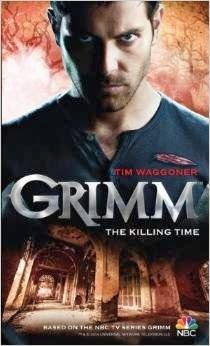
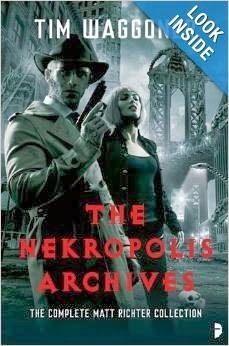
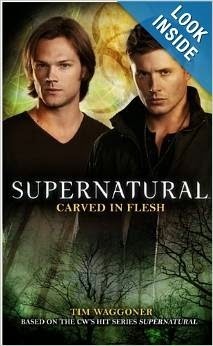
Tim Waggoner, Writing Horror, THE (EXTREMELY) SHORT GUIDE TO WRITING HORROR BY TIM WAGGONER,Grimm, Supernatural
Published on March 23, 2014 20:56
March 9, 2014
New Poetry Collection - Corpus Delicti: Selected Poetry
I have nearly completed my next collection of poetry to be (hopefully) published by James Ward Kirk Fiction sometime soon. The title I have chosen is Corpus Delicti: Selected Poetry. Over 150 poems and with an amazing Tais Tengcover thanks to Mr Teng himself via James Ward Kirk. Good people.
Anyway, I'll share the cover as soon as it's finalized. Stay tuned.
P.S. Here's some poetry that is included in the collection:
Petrification
some say it takes a lot of things to break you down but when it is given from above one time – without justification is all it takes to break your world when above is where you only look
& more times are sure to follow as the hunter stalks prey & this one time is all it takes to allow more of the same
the chocks beneath the wheels have been removed have disappeared, like so much dust to set in motion this caboose of pain careening down your life a drunken master steering
these are the cards we’re dealt dispassionately objectively, almost
like so much propagation in a petrii dish of sorts a la bacterium this roll of the dice.
Observations in a den of inequity
went to the casino the other night sitting there stone cold sober
pumping coins into a whore of a machine & she wasn’t giving me anything in return
in this Mickey-mouse neon tragedy with all its banal bells & whistles I looked around at the dead flowers being ground, into the putrid colours of the casino carpet
& everyone looks like they’re going down on this sinking ship & everyone looks like me ten twenty thirty Christ! even forty years tomorrow
Hungry for Oblivion
the neighbours are at it again i can hear their screams & grunts & thuds & things i just want to scream ‘SHUT THE FUCK UP’ but i don’t
i just lay in bed with blood pumping through my temples plotting violent means for violent solutions
i concentrate on a dog barking a little further up the street “just go back to sleep,” she says to me i roll over and dream of a river of cold beer just before i dive in my mouth salivating erect as a pigeon with rigor mortis hungry for oblivion
just before i dive in the fucking siren hits the end of the street & pretty soon the slap of feet on pavement running wading thru my river radios crackling thuds & thumps arrest the echo of the previous
& i know that they had just gone back to bed sore & bruised but nonetheless exhausted & resolved to sleep just as i had been yet somehow there is cold comfort in this new noise of violence relief i guess that i’m not on the end of it & it’s us grumbling in the dark about those fucking neighbours i try dreaming of something stronger maybe a river of whisky this time
Past Midnight
past midnight tired as hell eyes cracked/crapped blood bulbs/egg shells & the fingers click on the keyboard, arthritic & it’s medicinal heaven – eyes zoom in eyes zoom out u tripping or just flippin’ me the bird? yeah, me the bird & i’m flying home to you that’s right if your looks could kill i’d be cut up mutha . . . .
o, never mind then just go.
you better call the shots see the arrows for where they lay & cast your gaze ‘cross that beautiful smile in the mirror of my heart
& then he wakes up
from his vaselined dream & his bed’s still single & he’s still stoned thinking about that other one you know the one the brunette one that lives down memory lane at number 2 it’s a split life so just obey obey obey obey the hunger of your heart dear one.
Evil Speaks
evil speaks to me like a mother fucker spitting words into my ear like a dirty punk hell-bent on scalping me of my last twenty dollars for nothing i couldn’t give myself like a cop with an attitude hell-bent on half measures & beating the difference out of some poor sap
violence with words stabbed me to near death
i’m speaking good stuff but i ain’t listening and you keep talking, evil i can smell your breath on my neck as you molest me again i can feel your sweet fluid drowning my lungs with your malt whisky love
i listen to your music & it ain’t mine but the beat goes on & glasses clink & clank together in this slow motion murder show played out before my tired eyes it reminds me of a dark night under a damp jetty the cold ocean lapping at my soaked shoes dead again to the world survived again another night alive again barely evil speaking clichés & come ons into the dawn
In the meantime, want some more poetry?
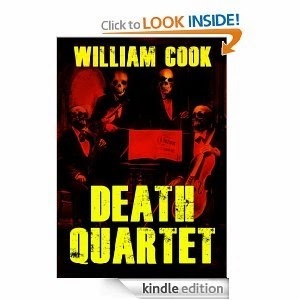

 Poetry, Death Quartet, Moment of Freedom, Temper of the Tide, Corpus Delicti, Tais Teng, James Ward Kirk,
Poetry, Death Quartet, Moment of Freedom, Temper of the Tide, Corpus Delicti, Tais Teng, James Ward Kirk,
Published on March 09, 2014 01:16
March 2, 2014
Interview with author Charlee Jacob
"Charlee Jacob...is clearly one of the best new writers working in the horror field today..." - Edward Lee, author of City Infernal and Dahmer’s Not Dead
"If horror literature has a queen, it is without a doubt Charlee Jacob." - Brian Hopkins, Bram Stoker Award Winning Author
"She has a fevered imagination, flashes of which would certainly give Clive Barker a run for his money...." - Brian Hodge, CyberPsychos AOD
"[Charlee] drapes her fiction in mysticism, dives deep into the unexplainable, the enigmatic and the totally insane." - Tom Piccirilli, Author of A Lower Deep

Charlee Jacob - Bio
Charlee Jacob has been a digger for dinosaur bones, a seller of designer rags, and a cook - to mention only a few things. With more than 950 publishing credits, Charlee has been writing dark poetry and prose for more than 25 years. Some of her recent publishing events include the novel STILL (Necro), the poetry collection HERESY (Necro), and the novel DARK MOODS. She is a three-time Bram Stoker Award winner, two of those awards for her novel DREAD IN THE BEAST and the poetry collection SINEATER; the third award for collaborative poetry collection, VECTORS, with Marge Simon. Permanently disabled, she has begun to paint as one of her forms of phsycial therapy. To see some of Charlee's paintings, click here. She lives in Irving, Texas with her husband Jim and a plethora of felines. To view a bibliography of Charlee's works, click here.
Interview with Charlee Jacob
Q: When doing some background research for this interview I found you to be quite an enigma in terms of your online presence. Aside from a handful of interviews there seems to be only a small amount of information available about you and your work. As a fan I find it hard to believe that such a prolific and gifted award-winning author is not better known. Does this frustrate you as an author or do you prefer to let your work speak for itself?
A: I was beginning to do a lot more about that when, about a decade ago I was declared fully disabled with Fibromyalgia and several other problems that made it nearly impossible to sit up, to walk, or perform most daily functions. Several MRI’s and Neurologists later and they diagnosed me with Parkinson’s. I have also developed Narcolepsy. It is this difficulty that frustrates me, the constant ten out of ten pain level and the inability to stay awake.
Q: Could you please tell the readers some things about your upbringing and how this led to you becoming a writer (of primarily horror fiction)? How much of your childhood, for example, informs the themes and motifs that are threaded through your work?
A: My upbringing was very baby boomer; cold war, and keep your mouth shut about the condition of your family’s dirty laundry. My work appears to be about 80% Post Traumatic Stress. Post Toasties Serial). As experts are fond of saying, “Write what you know.” –and if you don’t know it, all of the ink and your blood put together…well, this is why it’s called fiction.
Q: What I have read of your work gives me a very strong surrealistic impression with the dreamlike prose imbued with such vivid imagery. Do you intentionally write in order to invoke the surreal or otherworldly, or would you just consider it a by-product of your style?
A: Half is written in the liquefied flat line brains of all who have been and will be victimized by the beasts of this and other worlds. As for any of it being the by-product of my style, well, by-products are often the organ meat, gristle, and waste that society rejects.
Q: Do you think that the genre of horror is undervalued by potential readers who have preconceived negative ideas about the genre? Have you ever tried your hand at other forms/types of fiction and do you read much horror fiction yourself?
A: In the early to mid forties and fifties, people did have preconceived notions, dealing with horror not as spiritual (Seventeenth-century Salem, Massachusetts bake sale style), nor as noirishly chic as Mickey Spillane’s racy parts. I may interject that I write science fiction and used to read it all the time- like Mary Shelley’s ‘Modern Prometheus’.
Q: Your prose is quite often very poetic in the way you use language and the visually imaginative worlds you create. Do you find that when you write a poem it will morph into prose and/or vice versa? How important is the writing of poetry to you in terms of how you write prose – does one influence/inform the other?
A: Yes and Yes. Twenty two years ago everything I’d published was in poetry. Sometimes I even think and/or talk consciously this way. And as for morphing, what else do you call going to bed one kind of person and waking up almost ten years later as if born again into some persona from a long dream.
Q: Could you please tell us about your writing process? How do you come up with the ideas for your stories and how do you go about writing them? Do you outline your novels or is it more of an ‘organic’ process?
A: Most of my stories originate in nightmares. For others, I start out as I do often to write poetry, meaning I flip through a thesaurus, point at one word with my eyes closed, write that down, repeat the process—and the writing finger having written moves on. This Symbiotic Fascination started this way… first there was the ugly little man. My long poem ‘Taunting the Minotaur’ began in my head with one sentence- “How do I stop the bleeding”? I do outline some novels but always end up changing them.
Q: You write poetry, short fiction, novellas and novels – do you have a preferred medium or form? Do you have any favorite poets?
A: My preferred form is absolutely any path the piece feels like it needs to go down (or up). Three of my favorite poets are Sylvia Plath, Pablo Neruda, and Ann Sexton.
Q: Edward Lee has said you are “armed with a talent to write the most beautiful prose yet [use] that talent to examine the most unspeakable and detestable horror.” Do you use your writing to examine issues that are important to you? Is there any underlying message/s you try to impart to the reader, or do you prefer to think of your work as ‘art for art’s sake’?
A: I have never been able to write on a project if I didn’t care for the subject. If I can’t manage empathy for at least one character, how will I get the reader to do so? I need to write as a form of therapy and catharsis.
Q: As part of WiHM (Women in Horror Month) can you point to any female authors in the horror world that stand out to you? Who are your favorite female authors in general and why?
A: I always liked Melanie Tem, her work being studies in both controlled and free emotion (at least to my repressed obsessions). Lucy Taylor also, facile in her use of degradation that has somehow morphed into great beauty when we were sidetracked by the plot.
Q: What does the future hold for fans of your work? Are you working on anything new that you would like to share with the readers?
A: I have plans for two novels if I can manage to use my hands long enough and make my notes legible. My collection, ‘The Myth of Falling’ is due out any day now.
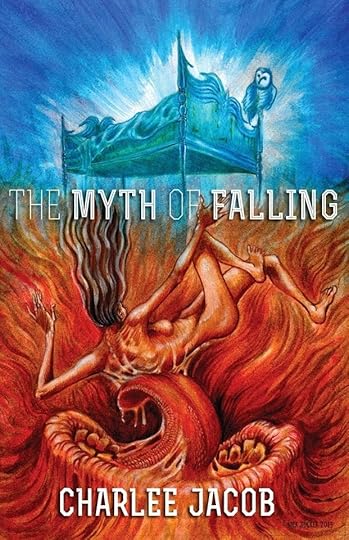 Cover art by Nick Gucker - http://www.nickthehat.com
Cover art by Nick Gucker - http://www.nickthehat.com
It has been an honor to interview you for WiHM. Thank you and I wish you all the best for your forthcoming ventures.
Charlee Jacob’s website
Charlee Jacob on Amazon
Free Reads from Charlee Jacob Download a free PDF of the short story "Flesh of Leaves, Bones of Desire," click here. Download a free PDF of the poem "Why the Journey's Far," click here.
Buy Charlee's Books
 STILLReleased in Lmtd. HC (100) and TPB (300), Necro 2008
STILLReleased in Lmtd. HC (100) and TPB (300), Necro 2008
 DARK MOODSReleased in TPB, Wilder 2008
DARK MOODSReleased in TPB, Wilder 2008
 DREAD IN THE BEASTReleased in Lmtd. HC (100) and TPB (300), Necro 2005
DREAD IN THE BEASTReleased in Lmtd. HC (100) and TPB (300), Necro 2005
Reprinted in TPB, Necro 2008
Released in eBook, Necro 2011 VESTALReleased in Lmtd. HC (250), Delirium 2005
VESTALReleased in Lmtd. HC (250), Delirium 2005
Released in eBook, Darkside Digital 2011 WORMWOOD NIGHTS (Novella) Released in Lmtd. HC (52) Chapbook (300), Bloodletting Press 2005
WORMWOOD NIGHTS (Novella) Released in Lmtd. HC (52) Chapbook (300), Bloodletting Press 2005
 SOMA(Expanded version of HAUNTER)
SOMA(Expanded version of HAUNTER)
Released in Lmtd. leatherbound HC (15) and Lmtd. HC (150), Delirium 2004
 HAUNTERReleased in mass market PB, Leisure 2003
HAUNTERReleased in mass market PB, Leisure 2003
 THIS SYMBIOTIC FASCINATION Released in Lmtd. HC (100) and TPB (300), Necro 1997
THIS SYMBIOTIC FASCINATION Released in Lmtd. HC (100) and TPB (300), Necro 1997
Released in mass market PB, Leisure 2002
S H O R T • S T O R Y • C O L L E C T I O N S THE INDIGO PEOPLEReleased in TPB, Wilder 2007
THE INDIGO PEOPLEReleased in TPB, Wilder 2007
 GEEK POEMS Released in Lmtd. TPB (300), Necro 2006
GEEK POEMS Released in Lmtd. TPB (300), Necro 2006
 GUISESReleased in Lmtd. leatherbound HC (15), Lmtd. HC (150) and TPB (500), Delirium 2002
GUISESReleased in Lmtd. leatherbound HC (15), Lmtd. HC (150) and TPB (500), Delirium 2002
Released in eBook, Darkside Digital 2011 SKINS OF YOUTH
SKINS OF YOUTH
with Mehitobel WilsonReleased in Chapbook (300) and Lmtd. HC (52), Necro 2002 UP, OUT OF CITIES THAT BLOW HOT AND COLD Released in Lmtd. leatherbound HC (20) Ltmd. HC (300/abt. 200 printed), Delirium 2000
UP, OUT OF CITIES THAT BLOW HOT AND COLD Released in Lmtd. leatherbound HC (20) Ltmd. HC (300/abt. 200 printed), Delirium 2000
TPB edition, Delirium 2003
Released in eBook, Darkside Digital 2011 DREAD IN THE BEAST (Collection)Released in Lmtd. HC (52) and TPB (300), Necro 1998
DREAD IN THE BEAST (Collection)Released in Lmtd. HC (52) and TPB (300), Necro 1998
P O E T R Y • C O L L E C T I O N S HERESYReleased in TPB, Necro 2007
HERESYReleased in TPB, Necro 2007
 SINEATERReleased in TPB, Cyberpulp 2005
SINEATERReleased in TPB, Cyberpulp 2005
 THE DESERT Released in TPB, Dark Regions Press 2004
THE DESERT Released in TPB, Dark Regions Press 2004
"If horror literature has a queen, it is without a doubt Charlee Jacob." - Brian Hopkins, Bram Stoker Award Winning Author
"She has a fevered imagination, flashes of which would certainly give Clive Barker a run for his money...." - Brian Hodge, CyberPsychos AOD
"[Charlee] drapes her fiction in mysticism, dives deep into the unexplainable, the enigmatic and the totally insane." - Tom Piccirilli, Author of A Lower Deep

Charlee Jacob - Bio
Charlee Jacob has been a digger for dinosaur bones, a seller of designer rags, and a cook - to mention only a few things. With more than 950 publishing credits, Charlee has been writing dark poetry and prose for more than 25 years. Some of her recent publishing events include the novel STILL (Necro), the poetry collection HERESY (Necro), and the novel DARK MOODS. She is a three-time Bram Stoker Award winner, two of those awards for her novel DREAD IN THE BEAST and the poetry collection SINEATER; the third award for collaborative poetry collection, VECTORS, with Marge Simon. Permanently disabled, she has begun to paint as one of her forms of phsycial therapy. To see some of Charlee's paintings, click here. She lives in Irving, Texas with her husband Jim and a plethora of felines. To view a bibliography of Charlee's works, click here.
Interview with Charlee Jacob
Q: When doing some background research for this interview I found you to be quite an enigma in terms of your online presence. Aside from a handful of interviews there seems to be only a small amount of information available about you and your work. As a fan I find it hard to believe that such a prolific and gifted award-winning author is not better known. Does this frustrate you as an author or do you prefer to let your work speak for itself?
A: I was beginning to do a lot more about that when, about a decade ago I was declared fully disabled with Fibromyalgia and several other problems that made it nearly impossible to sit up, to walk, or perform most daily functions. Several MRI’s and Neurologists later and they diagnosed me with Parkinson’s. I have also developed Narcolepsy. It is this difficulty that frustrates me, the constant ten out of ten pain level and the inability to stay awake.
Q: Could you please tell the readers some things about your upbringing and how this led to you becoming a writer (of primarily horror fiction)? How much of your childhood, for example, informs the themes and motifs that are threaded through your work?
A: My upbringing was very baby boomer; cold war, and keep your mouth shut about the condition of your family’s dirty laundry. My work appears to be about 80% Post Traumatic Stress. Post Toasties Serial). As experts are fond of saying, “Write what you know.” –and if you don’t know it, all of the ink and your blood put together…well, this is why it’s called fiction.
Q: What I have read of your work gives me a very strong surrealistic impression with the dreamlike prose imbued with such vivid imagery. Do you intentionally write in order to invoke the surreal or otherworldly, or would you just consider it a by-product of your style?
A: Half is written in the liquefied flat line brains of all who have been and will be victimized by the beasts of this and other worlds. As for any of it being the by-product of my style, well, by-products are often the organ meat, gristle, and waste that society rejects.
Q: Do you think that the genre of horror is undervalued by potential readers who have preconceived negative ideas about the genre? Have you ever tried your hand at other forms/types of fiction and do you read much horror fiction yourself?
A: In the early to mid forties and fifties, people did have preconceived notions, dealing with horror not as spiritual (Seventeenth-century Salem, Massachusetts bake sale style), nor as noirishly chic as Mickey Spillane’s racy parts. I may interject that I write science fiction and used to read it all the time- like Mary Shelley’s ‘Modern Prometheus’.
Q: Your prose is quite often very poetic in the way you use language and the visually imaginative worlds you create. Do you find that when you write a poem it will morph into prose and/or vice versa? How important is the writing of poetry to you in terms of how you write prose – does one influence/inform the other?
A: Yes and Yes. Twenty two years ago everything I’d published was in poetry. Sometimes I even think and/or talk consciously this way. And as for morphing, what else do you call going to bed one kind of person and waking up almost ten years later as if born again into some persona from a long dream.
Q: Could you please tell us about your writing process? How do you come up with the ideas for your stories and how do you go about writing them? Do you outline your novels or is it more of an ‘organic’ process?
A: Most of my stories originate in nightmares. For others, I start out as I do often to write poetry, meaning I flip through a thesaurus, point at one word with my eyes closed, write that down, repeat the process—and the writing finger having written moves on. This Symbiotic Fascination started this way… first there was the ugly little man. My long poem ‘Taunting the Minotaur’ began in my head with one sentence- “How do I stop the bleeding”? I do outline some novels but always end up changing them.
Q: You write poetry, short fiction, novellas and novels – do you have a preferred medium or form? Do you have any favorite poets?
A: My preferred form is absolutely any path the piece feels like it needs to go down (or up). Three of my favorite poets are Sylvia Plath, Pablo Neruda, and Ann Sexton.
Q: Edward Lee has said you are “armed with a talent to write the most beautiful prose yet [use] that talent to examine the most unspeakable and detestable horror.” Do you use your writing to examine issues that are important to you? Is there any underlying message/s you try to impart to the reader, or do you prefer to think of your work as ‘art for art’s sake’?
A: I have never been able to write on a project if I didn’t care for the subject. If I can’t manage empathy for at least one character, how will I get the reader to do so? I need to write as a form of therapy and catharsis.
Q: As part of WiHM (Women in Horror Month) can you point to any female authors in the horror world that stand out to you? Who are your favorite female authors in general and why?
A: I always liked Melanie Tem, her work being studies in both controlled and free emotion (at least to my repressed obsessions). Lucy Taylor also, facile in her use of degradation that has somehow morphed into great beauty when we were sidetracked by the plot.
Q: What does the future hold for fans of your work? Are you working on anything new that you would like to share with the readers?
A: I have plans for two novels if I can manage to use my hands long enough and make my notes legible. My collection, ‘The Myth of Falling’ is due out any day now.
 Cover art by Nick Gucker - http://www.nickthehat.com
Cover art by Nick Gucker - http://www.nickthehat.comIt has been an honor to interview you for WiHM. Thank you and I wish you all the best for your forthcoming ventures.
Charlee Jacob’s website
Charlee Jacob on Amazon
Free Reads from Charlee Jacob Download a free PDF of the short story "Flesh of Leaves, Bones of Desire," click here. Download a free PDF of the poem "Why the Journey's Far," click here.
Buy Charlee's Books
 STILLReleased in Lmtd. HC (100) and TPB (300), Necro 2008
STILLReleased in Lmtd. HC (100) and TPB (300), Necro 2008
 DARK MOODSReleased in TPB, Wilder 2008
DARK MOODSReleased in TPB, Wilder 2008
 DREAD IN THE BEASTReleased in Lmtd. HC (100) and TPB (300), Necro 2005
DREAD IN THE BEASTReleased in Lmtd. HC (100) and TPB (300), Necro 2005Reprinted in TPB, Necro 2008
Released in eBook, Necro 2011
 VESTALReleased in Lmtd. HC (250), Delirium 2005
VESTALReleased in Lmtd. HC (250), Delirium 2005Released in eBook, Darkside Digital 2011
 WORMWOOD NIGHTS (Novella) Released in Lmtd. HC (52) Chapbook (300), Bloodletting Press 2005
WORMWOOD NIGHTS (Novella) Released in Lmtd. HC (52) Chapbook (300), Bloodletting Press 2005
 SOMA(Expanded version of HAUNTER)
SOMA(Expanded version of HAUNTER)Released in Lmtd. leatherbound HC (15) and Lmtd. HC (150), Delirium 2004
 HAUNTERReleased in mass market PB, Leisure 2003
HAUNTERReleased in mass market PB, Leisure 2003
 THIS SYMBIOTIC FASCINATION Released in Lmtd. HC (100) and TPB (300), Necro 1997
THIS SYMBIOTIC FASCINATION Released in Lmtd. HC (100) and TPB (300), Necro 1997 Released in mass market PB, Leisure 2002
S H O R T • S T O R Y • C O L L E C T I O N S
 THE INDIGO PEOPLEReleased in TPB, Wilder 2007
THE INDIGO PEOPLEReleased in TPB, Wilder 2007
 GEEK POEMS Released in Lmtd. TPB (300), Necro 2006
GEEK POEMS Released in Lmtd. TPB (300), Necro 2006
 GUISESReleased in Lmtd. leatherbound HC (15), Lmtd. HC (150) and TPB (500), Delirium 2002
GUISESReleased in Lmtd. leatherbound HC (15), Lmtd. HC (150) and TPB (500), Delirium 2002Released in eBook, Darkside Digital 2011
 SKINS OF YOUTH
SKINS OF YOUTH with Mehitobel WilsonReleased in Chapbook (300) and Lmtd. HC (52), Necro 2002
 UP, OUT OF CITIES THAT BLOW HOT AND COLD Released in Lmtd. leatherbound HC (20) Ltmd. HC (300/abt. 200 printed), Delirium 2000
UP, OUT OF CITIES THAT BLOW HOT AND COLD Released in Lmtd. leatherbound HC (20) Ltmd. HC (300/abt. 200 printed), Delirium 2000 TPB edition, Delirium 2003
Released in eBook, Darkside Digital 2011
 DREAD IN THE BEAST (Collection)Released in Lmtd. HC (52) and TPB (300), Necro 1998
DREAD IN THE BEAST (Collection)Released in Lmtd. HC (52) and TPB (300), Necro 1998 P O E T R Y • C O L L E C T I O N S
 HERESYReleased in TPB, Necro 2007
HERESYReleased in TPB, Necro 2007
 SINEATERReleased in TPB, Cyberpulp 2005
SINEATERReleased in TPB, Cyberpulp 2005
 THE DESERT Released in TPB, Dark Regions Press 2004
THE DESERT Released in TPB, Dark Regions Press 2004
Published on March 02, 2014 18:53
February 25, 2014
Crime Watch Interview
9mm: An interview with William Cook
Kia ora everyone! Greetings from the bottom of the world, and welcome to the latest edition of Crime Watch's popular 9mm author interview series. The series has been a bit sporadic in recent times, after starting off with a hiss and a roar, maintained for a couple of years, but there is light at the end of the tunnel - I have several great 9mm interviews with authors famed and lesser-known in the bag, and will be sharing them with you all very, very soon. Onwards...
Today's author interviewee is a Kiwi horror and thriller writer, William Cook. He had his first novel, BLOOD RELATED, published in 2011, after writing short stories and poetry. Cook, who is a graphic designer and book cover artist, is currently working on his second novel. You can read more about him at his website here. But for now, he faces down the barrel of 9mm...
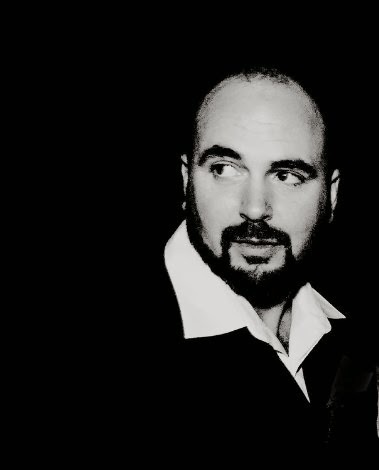 9MM: An interview with William Cook
9MM: An interview with William Cook
Who is your favourite recurring crime fiction hero/detective?
Will Graham, Thomas Harris’s troubled FBI profiler responsible for the original capture of the serial killer Hannibal Lecter, and the man who is assigned to locate serial killer Francis Dolarhyde. I also like John D Macdonald’s “salvage consultant”, Travis McGee.
What was the very first book you remember reading and really loving, and why? Tom Sawyer and the Adventures of Huckleberry Finn by Mark Twain. I had an advanced reading age when I was a kid and this novel appealed to me on many levels. It was literate and compelling and unlike any other book I’d read before. Once I started reading it I couldn’t put it down – for the next two years or so I tried to replicate Tom and Huck’s adventures in my own backyard. There were some high-thrills and scares in that book too, which sent shivers up my young spine. I loved it for what it was and for opening up to me a whole new world of ‘classic’ stories filled with adventure, mystery and thrills.
Before your debut crime novel, what else had you written (if anything) unpublished manuscripts, short stories, articles? Blood Related took me approximately 5 years to write, before that I had always written mainly poetry and short fiction. I have had verse published in periodicals like Poetry NZ, Southern Ocean Review and a handful of others (both NZ and American). I’ve worked in publishing and marketing in the past and have had reviews (book, music and movie) and articles published in various news media publications.
Outside of writing and promotional commitments, what do you really like to do, leisure and activity-wise? Writing, of course, is my favorite pastime and I do it every chance I get. I also love illustrating and have recently switched to digital design. I love using Photoshop to create other worlds and characters. I am married with four daughters so I spend a lot of my time doing family things when I’m not working on my personal projects. I rarely get the chance to read a book cover-to-cover these days but the Kindle has helped me get back into reading on the go – reading being something I would really like to do a lot more of.
What is one thing that visitors to your hometown should do, that isn't in the tourist brochures, or perhaps they wouldn’t initially consider? I have no idea really – I’m not much of an ambassador for Wellington. Don’t get me wrong, I like living here and there sure are worse places in the world but it is a small place. I guess one of my favorite spots in Wellington is the Miramar Peninsula – the green belt that runs from the now abandoned Mt Crawford Prison to the point. At night it is a very mystical place, especially under a full moon. The other place I really enjoy visiting is Staglands in the Akatarawas (Upper Hutt); it is a fantastic place with many native birds and animals and a superb recreation of a pioneer village filled with great photographic opportunities.
If your life was a movie, which actor could you see playing you?I think my life these days wouldn’t make for very interesting viewing – a guy hunched over a computer keyboard! I am similar in stature to the late James Gandolfini and admire his acting ability. I guess if he was alive he would be my first choice.
Of your writings, published and unpublished, which is your favourite, and why? I probably value my novel Blood Related the most but it is not necessarily my favourite. My collection ‘Death Quartet’ is one that I’m quite proud of but I would say that ‘Creep’ is my most compelling and well-written work to date. The story is the first story in an exciting and gritty new psychological thriller series. Cassandra (lead protagonist) is a hero to the victim and a merciless angel of death to evil doers. She is a killer of killers, striking fear into the hearts of those who get their kicks off hurting others. I guess this is probably my favourite because I feel as though I found my ‘voice’ with this one. Currently at work on the next two books in the series.
What was your initial reaction, and how did you celebrate, when you were first accepted for publication? Or when you first saw your debut story in book form on a online or physical bookseller’s shelf?To tell you the truth I went through a slump. There were a number of reasons but exhaustion was the main factor I think. The response to the book was slow and then gained momentum nicely then tapered off to a plateau of sorts. I think all writers have high expectations of their work, especially with the first novel, and so an anti-climax is inevitable. Strangely enough I think that my initial reaction was because I was saddened that my relationship had ended with my book! Sounds weird I know, but letting it go was sort of like losing an old pal – albeit, a rather frightening one. I was more excited when I saw a copy of my book at the local library; I made sure that every time I went for a visit, I put it in a position of prominence. A real kick.
------------------------------------------------------------------------------------------------------------
Thank you William! We appreciate you taking the time to chat with Crime Watch. --------------------------------------------------------------------------------------------
9mm, author interview, blood related, horror, new zealand thriller fiction, quickfire author interviews, william cook
Kia ora everyone! Greetings from the bottom of the world, and welcome to the latest edition of Crime Watch's popular 9mm author interview series. The series has been a bit sporadic in recent times, after starting off with a hiss and a roar, maintained for a couple of years, but there is light at the end of the tunnel - I have several great 9mm interviews with authors famed and lesser-known in the bag, and will be sharing them with you all very, very soon. Onwards...
Today's author interviewee is a Kiwi horror and thriller writer, William Cook. He had his first novel, BLOOD RELATED, published in 2011, after writing short stories and poetry. Cook, who is a graphic designer and book cover artist, is currently working on his second novel. You can read more about him at his website here. But for now, he faces down the barrel of 9mm...
 9MM: An interview with William Cook
9MM: An interview with William CookWho is your favourite recurring crime fiction hero/detective?
Will Graham, Thomas Harris’s troubled FBI profiler responsible for the original capture of the serial killer Hannibal Lecter, and the man who is assigned to locate serial killer Francis Dolarhyde. I also like John D Macdonald’s “salvage consultant”, Travis McGee.
What was the very first book you remember reading and really loving, and why? Tom Sawyer and the Adventures of Huckleberry Finn by Mark Twain. I had an advanced reading age when I was a kid and this novel appealed to me on many levels. It was literate and compelling and unlike any other book I’d read before. Once I started reading it I couldn’t put it down – for the next two years or so I tried to replicate Tom and Huck’s adventures in my own backyard. There were some high-thrills and scares in that book too, which sent shivers up my young spine. I loved it for what it was and for opening up to me a whole new world of ‘classic’ stories filled with adventure, mystery and thrills.
Before your debut crime novel, what else had you written (if anything) unpublished manuscripts, short stories, articles? Blood Related took me approximately 5 years to write, before that I had always written mainly poetry and short fiction. I have had verse published in periodicals like Poetry NZ, Southern Ocean Review and a handful of others (both NZ and American). I’ve worked in publishing and marketing in the past and have had reviews (book, music and movie) and articles published in various news media publications.
Outside of writing and promotional commitments, what do you really like to do, leisure and activity-wise? Writing, of course, is my favorite pastime and I do it every chance I get. I also love illustrating and have recently switched to digital design. I love using Photoshop to create other worlds and characters. I am married with four daughters so I spend a lot of my time doing family things when I’m not working on my personal projects. I rarely get the chance to read a book cover-to-cover these days but the Kindle has helped me get back into reading on the go – reading being something I would really like to do a lot more of.
What is one thing that visitors to your hometown should do, that isn't in the tourist brochures, or perhaps they wouldn’t initially consider? I have no idea really – I’m not much of an ambassador for Wellington. Don’t get me wrong, I like living here and there sure are worse places in the world but it is a small place. I guess one of my favorite spots in Wellington is the Miramar Peninsula – the green belt that runs from the now abandoned Mt Crawford Prison to the point. At night it is a very mystical place, especially under a full moon. The other place I really enjoy visiting is Staglands in the Akatarawas (Upper Hutt); it is a fantastic place with many native birds and animals and a superb recreation of a pioneer village filled with great photographic opportunities.
If your life was a movie, which actor could you see playing you?I think my life these days wouldn’t make for very interesting viewing – a guy hunched over a computer keyboard! I am similar in stature to the late James Gandolfini and admire his acting ability. I guess if he was alive he would be my first choice.
Of your writings, published and unpublished, which is your favourite, and why? I probably value my novel Blood Related the most but it is not necessarily my favourite. My collection ‘Death Quartet’ is one that I’m quite proud of but I would say that ‘Creep’ is my most compelling and well-written work to date. The story is the first story in an exciting and gritty new psychological thriller series. Cassandra (lead protagonist) is a hero to the victim and a merciless angel of death to evil doers. She is a killer of killers, striking fear into the hearts of those who get their kicks off hurting others. I guess this is probably my favourite because I feel as though I found my ‘voice’ with this one. Currently at work on the next two books in the series.
What was your initial reaction, and how did you celebrate, when you were first accepted for publication? Or when you first saw your debut story in book form on a online or physical bookseller’s shelf?To tell you the truth I went through a slump. There were a number of reasons but exhaustion was the main factor I think. The response to the book was slow and then gained momentum nicely then tapered off to a plateau of sorts. I think all writers have high expectations of their work, especially with the first novel, and so an anti-climax is inevitable. Strangely enough I think that my initial reaction was because I was saddened that my relationship had ended with my book! Sounds weird I know, but letting it go was sort of like losing an old pal – albeit, a rather frightening one. I was more excited when I saw a copy of my book at the local library; I made sure that every time I went for a visit, I put it in a position of prominence. A real kick.
------------------------------------------------------------------------------------------------------------
Thank you William! We appreciate you taking the time to chat with Crime Watch. --------------------------------------------------------------------------------------------
9mm, author interview, blood related, horror, new zealand thriller fiction, quickfire author interviews, william cook
Published on February 25, 2014 12:44

